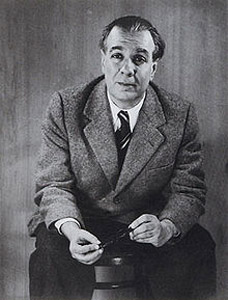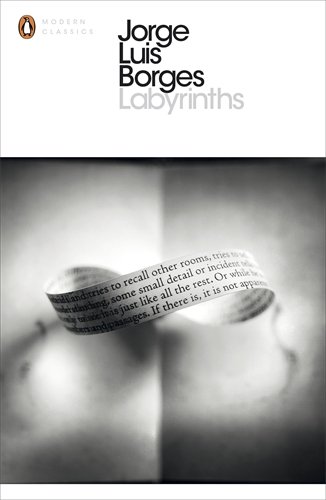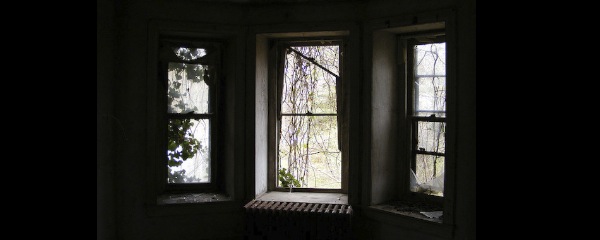
photo crop © Ryan T. Watson, 2010
*
In this essay, shortlisted for the 2016 THRESHOLDS International Short Fiction Feature Writing Competition, Jonathan Pinnock and his ‘mentor’ discuss the short stories of Jorge Luis Borges.
~
Comments from the judging panel:
‘A highly inventive and playful piece that recreates – with verve – the Borgesian tension between philosophical inquiry and creative mystery’; ‘witty and clever’; ‘a creative approach to the brief, with an admirable satirical and philosophical tone’.
~
 Jonathan Pinnock is the author of the novel Mrs Darcy Versus the Aliens (Proxima, 2011), the Scott Prize-winning short story collection Dot Dash (Salt, 2012) and the bio-historico-musicological-memoir thing Take It Cool (Two Ravens Press, 2014). He also writes poetry from time to time. He blogs at www.jonathanpinnock.com and tweets as @jonpinnock.
Jonathan Pinnock is the author of the novel Mrs Darcy Versus the Aliens (Proxima, 2011), the Scott Prize-winning short story collection Dot Dash (Salt, 2012) and the bio-historico-musicological-memoir thing Take It Cool (Two Ravens Press, 2014). He also writes poetry from time to time. He blogs at www.jonathanpinnock.com and tweets as @jonpinnock.
*
~
Under the Plexiglass Ceiling: ‘Funes, His Memory’ and ‘The Library of Babel’ by Jorge Luis Borges
by Jonathan Pinnock
Paddington Station is the embarkation point for trains run by the Great Western Railway, a company that, to quote my mentor Andreas deSouza, fails spectacularly in its aspirations towards greatness, but does at least attempt to convey its passengers in a roughly westerly direction. On the day of which I write, the early evening sun trickling through the unwashed plexiglass ceiling competed unsuccessfully with the station’s artificial lighting. It failed to cast any shadows on either deSouza or myself as we sat at our sticky, crumb-spattered table in the Caffè Ritazza. The background noise was an inchoate hubbub, punctuated by occasional muffled announcements of platform changes.
“The temptation,” said deSouza finally, “is practically irresistible.”
This was not what I had hoped to hear. “Is there no alternative?” I said.
“It seems not. In all my years of reading critiques of Borges’s work, I have yet to come across a single piece of straight prose. Without exception, every single writer has, for better or worse, succumbed to the siren call of pastiche.”
“Surely not?”
“The worst was a pupil of mine from a few years back who decided he should re-create ‘Pierre Menard, Author of the Quixote’ by actually becoming Borges, or, more specifically, Borges at the age of forty-five.”
“Good heavens. What became of him?”
“He was on his way to Buenos Aires when his ship sank off the Azores. There were no survivors. In many ways it was a blessing – for him as well as the rest of humanity.”
I never could tell if deSouza was joking and on this occasion his tanned, weatherbeaten face was as reliably inscrutable as ever. Even when he removed his glasses and began cleaning them with a pocket handkerchief, his eyes betrayed no hint of the veracity or otherwise of his story.
“So what should I do?” I said.
DeSouza shrugged. “Embrace it. Perhaps it will reveal something. After all, you could never accuse Borges of sacrificing style in favour of philosophical discourse. His works may at first seem like philosophical arguments but that’s a very superficial reading.”
“How so?”
“Consider ‘Funes, His Memory’ for example. Begin with the very first sentence:
I recall him (though I have no right to speak that sacred verb – only one an on earth did, and that man is dead) holding a dark passionflower in his hand, seeing it as it had never been seen, even had it been stared at from the first light of dawn till the last light of evening for an entire lifetime.
“It would surely be absurd to suggest that this reads like the introduction to a dry philosophical argument.” He picked up his coffee cup, found there was none left and replaced it with an air of disappointment.
 “But what purpose does Funes’ dark passionflower serve?” I said. “Is it simply there to ease us into the story – to fool us into thinking that this is something other than a dull philosophical discourse? I can’t believe that Borges would be that dishonest.”
“But what purpose does Funes’ dark passionflower serve?” I said. “Is it simply there to ease us into the story – to fool us into thinking that this is something other than a dull philosophical discourse? I can’t believe that Borges would be that dishonest.”
“Of course not.” DeSouza eased his bulk backwards in his seat and peered at me over his clasped hands. “Tell me what you think ‘Funes’ is about.”
“It’s about the paradoxical nature of memory,” I said. “The eponymous Funes is blessed – or cursed – with a supernaturally perfect memory. The problem with this is that such perfect recall lends equal weight to every single memory, thus removing any ability to make any judgment about the world. Abstract thought becomes impossible, for – to paraphrase Borges’s narrator – a ‘dog’ of three-fourteen in the afternoon, seen in profile, [has no relation to the same dog] at three-fifteen, seen frontally. Funes’ system of numbers, where every single number is ascribed a unique name, is arithmetically completely useless.”
“An interesting philosophical idea, certainly, and your summary contains its essence tolerably well. So why does Borges waste three thousand words or so wrapping it up in a story? What value is Borges adding here?”
“Perhaps the real story is about Funes himself, then? Perhaps its real power lies in the evocation of a particular place and moment in time?” Outside it was growing dark, although the diminution of light through the ceiling of the station had no discernible effect on the illumination of the food court.
“So you’re now saying that all the philosophical stuff is put in there to satisfy the pseudo-intellectuals?” DeSouza was enjoying himself.
“No, no, no, that’s not what I meant at all.” I was floundering.
“Or perhaps Funes is there to provide some kind of case study to amplify the argument?”
“Well, possibly – ”
DeSouza gave an indulgent smile and shook his head. “No. The thing is, the two aspects of Borges’s work are inseparable. His evocation of places and moments is an intrinsic part of his rhetorical method. Especially so, in the case of ‘Funes’, because what he does is present the idea of this gifted individual in a story that shows, in its very use of language, the disastrous nature of these gifts. While his narrator in that opening passage actually apologises for his use of the ‘sacred’ verb ‘recall’ (remarking that only one person – presumably Funes himself – has the right to speak it), Borges proceeds to give a perfect demonstration of how the recollection of just a few pertinent details can provide as good a picture as – better than, in fact – any photograph.”
I felt obligated to contribute some examples to the discussion. “Such as the description given of Funes in the opening paragraph? His taciturn face, its Indian features, its extraordinary remoteness – behind the cigarette. Or further on: the slender leather-braider’s fingers.”
“Exactly. And what about the description of the night the narrator spends talking to Funes? “I don’t think I saw his face until the sun came up next morning; when I look back I believe I recall the momentary glow of his cigarette.” Here, Borges captures an entire scene in two short phrases. The whole story is filled with demonstrations of how a single brushstroke can generate a complete emotional, value-laden memory so much more effectively than Funes’ hyper-eidetic efforts. But this ability of Borges’s to evoke a scene remains entirely in the service of his philosophical argument.”
My train was still half an hour or so away from departure, so I proposed we should retire upstairs to the bar of the Mad Bishop and Bear. I ordered a pint of London Pride, while deSouza restricted himself to a tonic with a dash of Angostura Bitters. I raised an eyebrow at this, and he replied by patting his vast stomach. I noticed he declined the slimline option, however.
“So if the evocative quality of Borges’s writing is inextricably connected to his philosophical arguments,” I said, “where does the power of his short stories come from?”
DeSouza’s smile indicated that we were approaching the core of his argument. “I think you may be guilty of a false dichotomy there. I would suggest that, in the case of ‘Funes, His Memory’ at least, the power of Borges’s writing derives from his ability to engage both the head, with his philosophical ideas, and the heart, with his beautiful and evocative writing. It’s a two-pronged assault.”
“And one that perhaps explains his appeal to both the geeks and the literati?”
DeSouza winced. “If you choose to put it like that, yes.”
I took a swig at my beer. “But what about a more obviously cerebral story? Such as, say, ‘The Library of Babel?’”
“A story about a library? Surely that would be bound to appeal to your ‘literati’?”
“You know what I mean,” I said.
“OK, so tell me what you understand this story to be about.”
 “It’s the story of an infinitely large library which contains every single possible book that ever has been written, or indeed could ever be written. There is no record of who built the library; it has always existed. The story tells of the search for books of prophecy and wisdom in this library, frustrated by the fact that most of the books in the library are inevitably complete gibberish. Not only that, but they are not organised in any useful manner. The theme is similar to ‘Funes, His Memory’, in that each random permutation of the available twenty-five orthographic symbols is accorded equal weight. A book containing, for example, four hundred ten pages of unvarying M C V’s has the same value as the text of, say, the original folio edition of Hamlet. Despite the universality of the library’s contents, it has no utility.”
“It’s the story of an infinitely large library which contains every single possible book that ever has been written, or indeed could ever be written. There is no record of who built the library; it has always existed. The story tells of the search for books of prophecy and wisdom in this library, frustrated by the fact that most of the books in the library are inevitably complete gibberish. Not only that, but they are not organised in any useful manner. The theme is similar to ‘Funes, His Memory’, in that each random permutation of the available twenty-five orthographic symbols is accorded equal weight. A book containing, for example, four hundred ten pages of unvarying M C V’s has the same value as the text of, say, the original folio edition of Hamlet. Despite the universality of the library’s contents, it has no utility.”
“From your description, that certainly sounds like an intellectual argument masquerading as a short story,” said deSouza. “But the story also has a very definite sense of place, does it not? I have certainly got a very definite image of the library in my head, a structure composed of an indefinite, perhaps infinite number of hexagonal galleries.”
“It’s a rather dull passage, though, is it not? I would hardly describe it as evocative:
The arrangement of the galleries is always the same: Twenty bookshelves, five to each side, line four of the hexagon’s six sides; the height of the bookshelves, floor to ceiling, is hardly greater than the height of a normal librarian. One of the hexagon’s free sides opens onto a narrow sort of vestibule, which in turn opens onto another gallery, identical to the first.
“And so on.”
“At first, I agree. But later on we learn that these hexagons contain two tiny compartments. One is for sleeping, upright; the other, for satisfying one’s physical necessities. That tells us a lot about the nature of the obsession that is mandated of the denizens of the library. This leads on to this remarkable section:
Like all the men of the Library, in my younger days I traveled; I have journeyed in quest of a book, perhaps the catalog of catalogs. Now that my eyes can hardly make out what I myself have written, I am preparing to die, a few leagues from the hexagon where I was born. When I am dead, compassionate hands will throw me over the railing…
“That is surely an exceptionally powerful image. But, once again, it is there to support Borges’ intellectual argument, by demonstrating the all-encompassing nature of the Librarians’ search for meaning. It is, literally, the entire purpose of their existence.”
“Even if completely futile.”
“Well, it is a metaphor for our own, perhaps equally futile, search for meaning. Borges lets that slip in the opening sentence: The universe (which others call the Library)…”
“Is it really?” I said, not wishing to pass up a chance to put one over deSouza. “Or is Borges actually talking about the creative act here?”
“Go on.”
“Isn’t the Library of Babel similar to the lump of marble waiting for Michelangelo to carve David from? Formless, but with infinite possibilities?”
DeSouza took a sip of his tonic water and was silent for a time. “Perhaps he is merely saying that the search for meaning and the creative act are the same thing. In any case, I think I detect some agreement with my thesis that, like ‘Funes’, the power of ‘The Library of Babel’ derives from both the intellectual argument and the evocative writing. In Borges’s work, the two are always inextricably linked. There are no clear-cut answers: the philosophy and sense of mystery are in a constant state of tension, and Borges knows the only path to the truth is to pay both of them equal attention.”
I finished my beer and looked at my watch. It was almost time to catch my train. I closed my laptop, put it in my shoulder bag and stood up. As I made my way down the escalator, it struck me that I had not thanked deSouza or even said goodbye to him. I had called him into existence to serve a rhetorical purpose and had dismissed him without a further thought once his purpose was over. I wasn’t even sure if I’d allowed him to finish his drink. In the end, I decided to leave him there in the bar, dreaming perhaps of another reviewer – a figment of his own imagination – struggling to finish their piece before the deadline. I was sure I could rely on deSouza to help him out.


One thought on “Under the Plexiglass Ceiling”
Comments are closed.